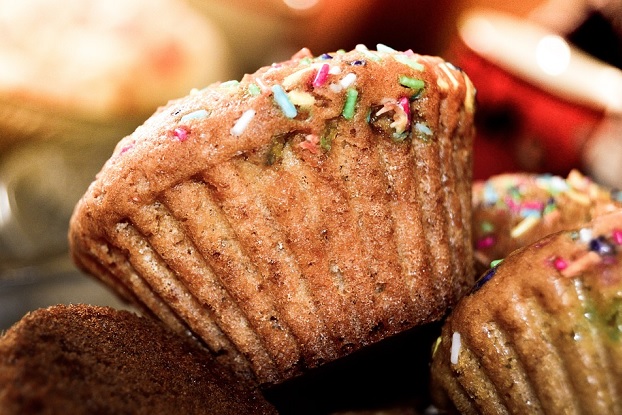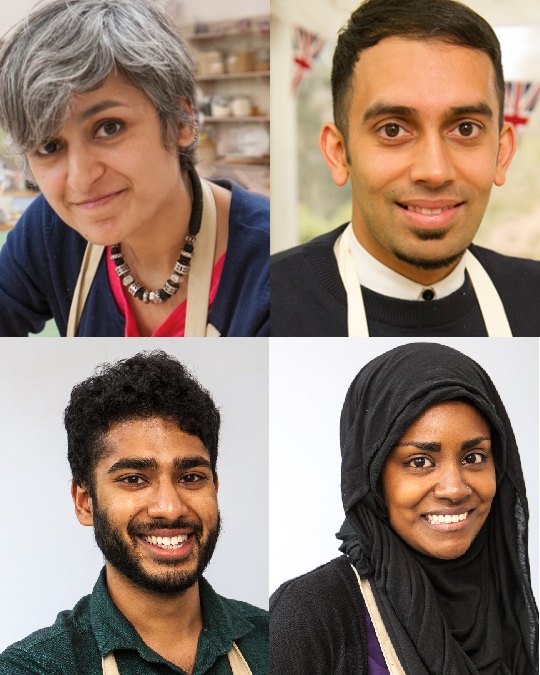
It’s no secret to my friends, family, or anyone who follows me on Instagram that I love to bake. It makes sense, really, when I think about it: I’ve been working in labs ever since the tender age of 17, and though I’ve moved on from a career in bench science, I still have itchy fingers. My love of detail, my obsessiveness toward process and precision, combined with the immediate gratification of having something come out of the oven looking just as I dreamed it would, make baking the perfect outlet for the skills I honed.
Not unlike many other Desi-American kids, I grew up in a home with lots of Desi home cooking, but not a lot of baking. I was lucky enough, however, to live in a household with not just one, but two accomplished cooks. I scarfed down fresh, hot chapathis and daal, rasam and rice, and my favorite, tomato sambar (my father’s particular specialty) regularly.
When I went off to college, however, I realized how much a home-cooked meal meant to me. My freshman year, when I lived in the dorms, I longed for the food of home. I’d look down at my plate of overcooked spaghetti with Parmesan from a green can, and tears would well up in my eyes as I thought about the sharp, tangy flavors of tamarind rice, or the gentle heat of the biryani that my parents and younger brother were probably enjoying at that exact moment.
When I moved off-campus into an apartment for my sophomore year of college, I was determined to fix things. I was going to learn how to cook. Cooking was the easy part, though. As I scanned the internet for recipes I felt I could tackle, I also came across more and more recipes for baked goods. While scanning the pages of cookbooks, lusty images of cakes, cookies, and pies would sing to me like a siren’s call. It’s just butter, flour, sugar, and dough, I’d think. If I can make cells grow at my will in the lab, why can’t I make a cake rise?
“If I can make cells grow at my will in the lab, why can’t I make a cake rise?”
Thus, my love affair with the oven began. When I visited my parents, I’d crank their oven on, for probably the first time in months (my mother, as I suspect many other Desi mothers do, uses her oven primarily as extra storage space for her many tawas) — and get baking. My results were shaky at first. I remember making maple mini-muffins with the texture and flavor of ping-pong balls. But my family, ever supportive of my ventures, would attempt to eat them anyway and encourage me to keep trying.
As the years passed, and my scientific skills improved, so did my baking skills. I had gone from ping-pong mini-muffins to perfectly chewy chocolate chip cookies. My father’s favorite carrot cake came not from a bakery, but from my oven, and my apple pie graced many a Thanksgiving table.
As my zeal as an amateur baker increased, so did my thirst for resources to learn more about the art and science of breads, pastries, and cakes. So, when I heard that The Great British Baking Show (known in the UK as The Great British Bake-Off) was available on Netflix, I gave it a shot. I tuned in to the first season and watched with moderate interest as they introduced the bakers who would be competing — moderate interest, that is, until they introduced Chetna, the lone British South Asian contestant of that season.
Chetna, the show explained, had grown up in India, and moved to the UK as an adult. She was an avid home baker. She hoped to pass her skills on to her children, who eagerly watched her in the kitchen when she baked. She made a lovely Victoria sponge. She spoke knowledgably about egg foams. She was, instantly, the contestant I was rooting for.
Consciously or unconsciously, I wanted her to win because she looked like me; her British accent, softened with the undertones of her Indian accent, sounded like the speech of people I loved. She felt, for lack of better word, comfortable. However, as I watched her progress through the episodes, something else became apparent in her baking — she wasn’t just a great British baker, she was a great British South Asian baker.
She made cakes flavored with coriander and cardamom, her pastries were glazed with chai masala, and she even made kachoris that looked like the ones I grew up eating, by hand. She was a great British baker, for sure, but one that acknowledged her family and her roots through her food.
“She was a great British baker, for sure, but one that acknowledged her family and her roots through her food.”
To my surprise, the judges welcomed her additions to the already impressive baking pantheon showcased in that series. Each time she made a dessert, I’d steel my stomach for the judges to criticize her on her use of flavor. Each episode, I’d think, “This is the day the flavors are too much for them. This is the day that being a Desi baker is going to backfire on her.” It never happened.
Though she didn’t make it to the season’s final episode, her acknowledgement of Indian flavors was not seen as a weakness, but as her greatest strength as a baker. Perhaps most importantly, it showed me that she had a place among the other accomplished bakers she competed with, without having to sacrifice the flavors that made her creations her own.
I’m no stranger to arguments about representation. Representation, goes a long way in fending off feelings of alienation, particularly for children of color and children of immigrants. It makes them feel like they belong, when their immediate surroundings might make them feel different, or unwanted.
Until now, however, my thoughts about representation mostly revolved around children, and giving them the support in their formative years that I rarely had from the media when I was a child. I always thought it was much too late for me — there was no arena I truly cared about where I needed to feel I was allowed.
Watching The Great British Baking Show showed me how wrong I was. I had never realized how much I needed a role model in the field of baking. Although I am an avid consumer of American cooking and baking competition shows, I never realized before how rarely I saw people that looked like me, or whose culinary styles had been influenced by the same flavors that mine had.
“I never realized before how rarely I saw people that looked like me, or whose culinary styles had been influenced by the same flavors that mine had.”
Subconsciously, I had never felt like I belonged in that world. I was always a spectator, longing to reach the sort of skill level where a judge might laud a cake or pastry I had produced, but I never felt I was quite welcome. Watching Chetna on the show (and in subsequent seasons, Ali, Tamal, and Nadiya), I suddenly felt I might have a place in this world of macarons and profiteroles. I finally felt that my passion for baking was something I should stop feeling was a throwaway skill.

As I devoured episode after episode, watching Chetna’s progression through the show made me re-evaluate my own style in the kitchen. Here I was, a Desi-American baker making all-American apple pies. While a traditionally American apple pie did deserve its rightful place in my repertoire, focusing the entirety of my attentions on making one that tasted exactly the same as one from my neighborhood bakery was perhaps denying me the pleasure of exploring flavor profiles that meant more to me than technical perfection did.
Making a perfect red velvet cake gave me the euphoria of executing a recipe with excellence, but it did not allow me to have an emotional connection with the things I created. All of my brain was in my recipes, but none of my heart was.
The next time I was asked to bring something to a potluck I chose a recipe I knew like the back of my hand — mini lemon cheesecakes. I had made this recipe time and time again, with a traditional graham cracker crust and a tangy, soft, lemon cheesecake atop it. But this time, I was determined to do something different. I was determined to make it my own.
I thought back to the South Indian lemonade (also called paanaka) that my grandmother and mother had made for me when I was a child, after a day of playing outside in the hot sun, and I started fiddling with my recipe. I’ll admit, I was nervous at first. As a mere home baker, who was I to mess with a tried and tested format? But I pressed on, adding this and removing that until I was happy.
When I brought my paanaka cheesecakes, with a ginger cookie base and a salty-sweet lemon-cardamom filling to the potluck, I was nervous. This wasn’t the dessert I had promised the group, and I didn’t know if it would go over well. Much to my relief, they all seemed to enjoy it, perhaps more than anything I had made before. One friend even said it was apparent that I had come up with the recipe, which was the highest praise I could have asked for.
By no means am I a professional baker. I may not even be an incredible amateur baker. But thanks to The Great British Baking Show, not only do I now have a clear vision for the sort of baker I’d like to be — one informed by the flavors and memories of my childhood — but I know it’s an arena I have a place in.
* * *
Rashmi Venkatesh is a pharmacologist who now works behind a desk and lives in the Metro D.C. area. Her interests include feminism, pop science, South Asian diasporic culture and media, and biryani. You can find her on Twitter at @rashmiv11.












